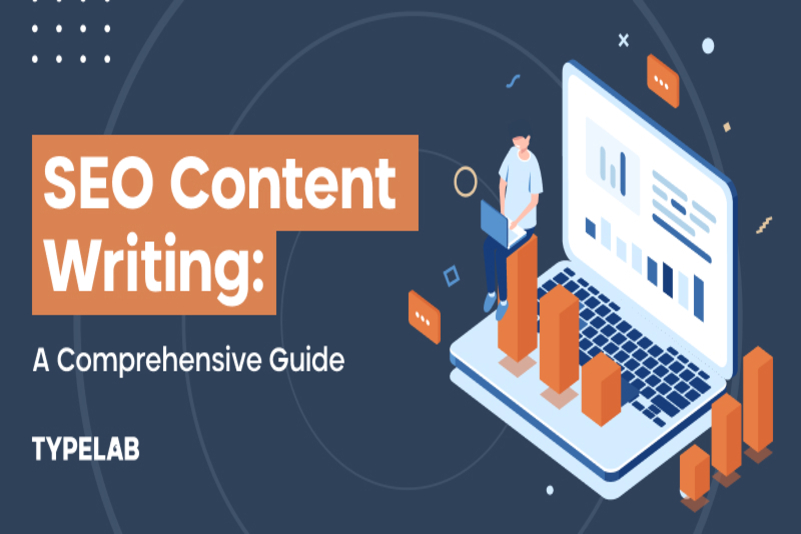In the past, a well-written blog that engages readers would have been enough to increase your online traffic and conversions—but not anymore. These days, it's not only the readers you should please. You also need to satisfy search engine algorithms that decide whether or not you deserve a high ranking in their search results pages. This is where SEO content writing strategies come into play.
Businesses are starting to recognize the crucial role of SEO writing. However, many find it challenging, whether because of the technical aspects or the amount of work it requires.
You could be one of these businesses trying to understand the process right now. This comprehensive guide will help you learn the ropes of SEO and create valuable content that can boost your brand.
Contents
Part 1: SEO Content Writing Basics
Part 3: SEO Content Strategies in 2023
Part 4: Best Content Writing Tools
What Is SEO Content Writing?
SEO writing is a process that entails creating high-quality website content to appear on the first page of the search engine results pages (SERPs). It involves keyword research, competitor analysis, understanding the search engine's algorithm, and other related processes.
SEO writing starts with building a content brief containing (but not limited to) the following:
- Relevant topics and subtopics
- Primary and relevant keywords
- Inbound and outbound links
- Ideal word count
- Target audience
An SEO writer then produces the content accordingly for optimal results. We’ll learn more about these elements as we go along.
Why Is SEO Necessary to Your Business?
SEO writing helps you appear on the first page of an SERP. But that's only one of the reasons it matters in business growth. Here are three more reasons to incorporate SEO writing into your business and work with an SEO content writing agency.
Boosts Brand Awareness
A study shows that business blogging boosts web visitors by 55%. When partnered with SEO, good content can bring you to the top search engine results page. It can help your brand reach an extended target market. If you're a startup or small business, this would be highly beneficial in building your online presence.
Improves Brand Reputation
People are more likely to engage with a reputable and reliable brand. If your website produces high-quality, optimized articles, you can guarantee people's positive perception of your company. This means producing accurate information and leading in-depth discussions to educate readers about your expertise.
A More Affordable Marketing Method
Paid advertising rates have gone up rapidly in the past years. However, it's not always the safest bet for marketing, especially for those on a tight budget. This prompts businesses to look for cheaper and organic marketing strategies to support or compensate for what they can't afford. SEO writing meets this demand exceptionally well.

What Is an SEO Content Writer?
Now let's talk about the person behind the art of SEO writing: the SEO content writer. An SEO content writer is a professional who writes different types of web content (more on this later) to help a business demonstrate their expertise and showcase their offers.
The Difference Between an SEO Content Writer and SEO Copywriter
You may see the term SEO content writer used interchangeably with SEO copywriters. Essentially, they’re not the same thing. Content writers produce long-form content to establish a connection with the brand’s audience, while copywriters focus on short sales copies that convert traffic to leads.
Another way to look at it is that an SEO content writer for a website answers people's questions about your brand and niche, whereas an SEO copywriter writes to sell, focusing on ads and other marketing materials. Both use SEO strategies to benefit your business; it's only a matter of knowing your goal and finding the right person for the job.
What Skills Should a Content Writer Have?
Assuming you've decided to hire SEO content services, here are five traits to determine whether your candidate fits your company.
Excellent Writing Ability
The first factor to look at is the writer's writing skills. They must be capable of producing well-written articles with an organized structure, digestible content, and fluency in the language. Their work should also show compliance with the brief. This will demonstrate their ability to write good content relevant to your objectives.
Great Communication Skills
A professional content writer must know how to communicate effectively with the team they'll work with. They can help you understand how things work so you can align tasks with your goals and guarantee success. This trait is crucial if you have very little knowledge of SEO writing.
Knowledge in SEO
Sufficient knowledge of search engine optimization is essential when hiring a content writer. After all, you're aiming for the first page or top spot of the search engine results. You need someone who understands how SEO works and how to apply it to their writing style strategically. They must also be up-to-date with the best SEO practices.
Thorough Research Skills
Good content comes from extensive research. This is especially true for content writers. They must fully understand their topic to write an accurate, trustworthy, and informative article. When hiring, ask about their research process and test their ability to see if they fit the job description.
Great Adaptability
A good content writer should be able to adapt to your brand's tone and voice. They mostly speak for your brand, so their articles must reflect your brand image. If your company image is expert and professional, the content writer should write in the same style. This allows you to connect effectively with your readers.

Types of SEO Content
Various types of SEO content are available to leverage your digital marketing efforts. Each type has unique benefits, and SEO writing services can demonstrate the potential of each.
Understanding the different types of SEO content and their role in search engine optimization can help you achieve optimal results. Let's explore each of these types and how they improve your content marketing strategy.
Product Pages
Product pages are designed to promote your product or service, helping them rank higher in SERPs. They contain important information about your offer, including product titles, descriptions, images, videos, and customer reviews. With these details, you give visitors everything they need to make an informed decision.
These pages are optimized to target specific keywords and phrases associated with your product or service, ensuring that your website appears in relevant searches. They're powerful tools for improving site visibility, increasing leads, and boosting conversions.
Landing Pages
Specialized landing pages make converting visitors into leads easier. They typically feature a single call-to-action (CTA) that encourages visitors to take a desired action, such as filling up a form, signing up for a service, or subscribing to a newsletter.
Landing pages are the first contact point between the user and your website, so it's crucial to make them compelling. Using them can help you gain more leads and generate sales. You can also use landing pages to capture customer data and make better marketing campaigns in the future.
One-Pagers
Single-page sites may be the best option if your goal is to quickly and effectively capture the attention of potential customers. Use them to pitch your brand and intrigue visitors enough that it increases your online presence in search engines.
Unlike landing pages, one-pagers focus on presentation rather than advertising. Therefore, you can be creative with visuals and link more detailed content to communicate your brand's message. By presenting the essential information about a topic or keyword phrase on one page, you can create a memorable impression on the user.
One-pagers are a treat for users to interact with and an effective SEO strategy. Both search engine spiders and human visitors can easily understand them.
Blog Posts
Blog posts help you provide fresh, up-to-date, relevant, and shareable content, gradually improving your site's authority and visibility. Creating SEO-rich blogs relevant to your niche increases the chances of your pages appearing on a high spot in the SERPs.
Here are the different types of blogs to use depending on your digital marketing goal.
| Listicles | Listicle blogs combine points with short descriptions on a list to make scannable and easy-to-digest content. This blog format breaks up long blocks of text, so readers can quickly find the information they're looking for. Listicles are also engaging and shareable. They're an excellent way to grow your organic traffic and stand out in the competition. |
| Guides | Guide blogs educate readers about a particular topic with comprehensive, reliable, and up-to-date information. These blogs can range from simple how-to topics to in-depth technical advice. Use them to provide helpful tips on a particular subject and tutorials or step-by-step instructions on completing a particular task. Include links for additional resources to lead readers to other useful websites, products, or services they may need to achieve their goals. |
| Reviews | Review blogs feature thorough assessments of a product or service. They discuss the subject's features, benefits, drawbacks, and overall performance. Review blogs also include details about the brand, pricing, customer experience, and more. This type of blog can help consumers make an informed buying decision about the product or service, improving sales and customer engagement. |
| Case Studies | A fantastic way to showcase the success of your company, product, or service is through case study blogs. These blogs provide a concrete, detailed, and in-depth look at how you helped clients achieve their desired results. The data involves numbers and graphs for credibility. |
Pillar Posts
Pillar posts are long-form pieces of content designed to be highly informative. Use them to cover broad topics related to your industry and provide relevant, in-depth information about them. These posts also incorporate multimedia content to draw in and hold the reader's attention.
Writing pillar posts can be challenging in terms of length, quality, and value. This is why many businesses use professional content writing services to ensure quality content with SEO best practices.
White Papers
White papers are comprehensive reports that solve specific industry issues. They're typically longer than other types of content and often include data, graphs, and statistics to discuss specific points. Use this research-based content to educate your readers or help them solve problems and make better decisions.

How Do You Write Good SEO Content That Ranks?
Now that you're familiar with SEO writing basics, let's discuss how to do SEO content writing well. When implemented correctly, these strategies can elevate your articles from 0 to 100! It can seem overwhelming, but let’s break it down into 10 steps:
1. Understand Google's Algorithm
A search engine algorithm is a complex system that uses web crawlers to review a website's content. It follows certain ranking factors that help evaluate web pages according to relevance and deliver optimal results for people's queries. The algorithm decides whether or not your website or page is worthy of being on the first page of SERPs.
The following are (but not limited to) Google's ranking factors:
- Relevance and usability
- Accessibility
- Loading speed
- Website security
- Search intent
- Content quality
- Keyword use
- Searchability of image or video content
- Overall site health
Note: The ranking factors may change as Google's algorithm continuously updates.
2. Analyze Your Competitor's Content
The digital marketing field is hugely competitive, so you must seek a solution to stand out. One method is to check on your direct and online competitors. No, you're not going to copy their content strategy. You will analyze them to understand where you stand in the competition and devise a unique plan for your brand.
Use Google's ranking factors if you need help figuring out where to start your analysis. Look at the performance of your competitor's pages, keyword use, content quality, frequency, quantity, etc. This enables you to develop a better SEO content strategy.
3. Find Keywords
Keyword research is an integral part of SEO content writing. The right keywords will help you become visible in relevant search results. It will also help you discover topics your target audience is interested in based on their queries. And from there, you can create content that meets your readers' needs.
But strategic keyword research is more than just searching and collecting relevant terms. It also includes determining the main keywords and related keywords.
Main Keyword
The main keyword is your primary target. A content writer develops a topic based on it and ensures that the rest of the content is cohesive. They also apply this keyword 1-2 times on an article, particularly in the title and one of the headings.
Related Keywords
Related keywords are the variants of the main keyword. They are synonymous or semantically related search terms and help maximize your SEO efforts. Content writers use them only once in the content, particularly in the sub-headings.
Balance the Search Volumes
Search volume refers to the frequency of a keyword. A high search volume is good because it indicates that many people use them to search for information. But if the volume is too high (a thousand or higher), it indicates tough competition.
It will be challenging to rely on high-volume keywords alone, so mix in terms with lower (but not too low) search volumes. Typically, short-tail keywords are higher in volume than long-tail keywords. Combine them to target every relevant audience and gain a competitive advantage.
4. Outline And Plan
After collecting information about the algorithm, your competitors, and keywords, create the SEO content brief and outline. These should include all the guidelines to ensure the content meets your goals. A standard SEO content outline template comprises an intro, body, and conclusion.
5. Write for Humans First
While SEO content writing necessitates compliance with search engine guidelines, this doesn't imply that you should write for bots. If you do this, the structure and use of language will not appear natural and may turn your readers off. So always write for humans first.
Make the Content Unique and Value-Adding
Always write original content. It prevents you from being flagged and establishes your reputation as an expert in your field.
Also, you're most likely writing articles that your competitors also discuss. To keep people interested in your brand, write distinct and better versions of the content.
Use Varied Content Types
Ask your content writer to create different types of content, from blogs to social media video scripts. No one wants to see the same type of content repeatedly. Search engines also favor varied content types, so there's no reason to stick to one format.
Write Content Your Audience Wants to See
Write about what your audience wants and needs. Use keywords, Q&A sessions, surveys, reviews, support calls, or customer profiles to find these topics and create compelling content. And when creating the content, make sure it's easy to understand so people can connect with your brand.
6. Aim for Long But Scannable Posts
Your job as a content writer is to write valuable articles that readers can easily consume and learn from. Studies show that long-form content performs better in organic SEO than short content. But to some people, such an amount of content can be overwhelming.
Here are a few ideas on how to make scannable and easy-to-digest content.
Use Plenty of Subheadings
Headings and subheadings enhance the structure of your content. They break long blocks of text through extra spacing and distinct font sizes and styles. They make excellent visual reference points.
Use Graphics
Make the most of visual aids with graphics. Look for content sections that could benefit from an infographic, table, or short video. For example, convert statistics or any section involving numbers into graphics so people can process the information faster.
Incorporate Bullet Points
Using bullet points is a fantastic way to organize complex and long-form content. Divide blocks of text at most seven points with 2-3 sentences each. The sentences must also contain the same structure for consistency. If one starts with a verb, the other points should have the same sentence pattern.
Use Pull Quotes
Do you want to grab the reader's attention toward a particular sentence? SEO writing with a pull quote can make that happen. Typically, it's a short sentence said by someone else, but it could also be any sentence in your content that you find significant. If you intend to insert more than one quote, do so sparingly. Include attribution if the quote is from someone else.
7. Optimize Your Content for Featured Snippets
Featured snippets are content previews of a particular web page. They're located above the regular SERPs and below the ads to immediately answer a user's question and enhance the overall experience. If you want your content to get featured, optimize your content for relevance.
- Go beyond traditional keyword research (e.g., ask people in your community, friends, or followers).
- Look for search queries and write or optimize content that answers them.
- Be factual, concise, and organized with your content.
- Use eye-catching visuals.
- Monitor your progress and adjust the strategy accordingly.
8. Add Internal Links
Internal links are pages on your website that extend or connect relevant information from one page to another. It helps the readers find more data that might interest them. It also helps Google realize which pages of your website are relevant. It's a vital ranking factor, so work with an SEO article writing service to list your most valuable website pages.
9. Add High-Quality External Links
External links are pages from other websites that elaborate on the information in your article. They should be high-quality and authoritative, so Google will consider your content relevant and rank you higher in the SERPs.
For example, check whether the external source has a high Domain Authority (DA) score. Pulling sources with credible domain extensions like ".org," ".gov," or ".edu" is another option.
10. Write Meta Information Containing the Main Keyword
Before clicking, users look for a preview of a specific page on the search results. This is called meta information. Search engines also need that to determine your ranking in the SERPs. To use them as part of your ranking strategy, include your main keyword in the following:
Header Tags
Incorporating header tags enhances readability and makes your page SEO-ready. They divide all the headings and subheadings on a web page according to their importance. It starts from H1 and ends with H6, depending on the context of your page.
Page Title
Also known as the title tag, the page title is a brief description of your web page that appears in the SERPs and on a browser tab. It's a vital element of SEO writing, so including the main keyword is necessary.
Meta Data
Meta data is classified into two: meta title and meta description. Both provide short but essential information about a specific web page. These help search engines know what your content is about and rank it accordingly. It'll also be easy for users searching for information similar to yours.
Anchor Text
When using internal and external links, the text in the hyperlink becomes clickable, underlined, and of a different color. That's the anchor text. A good anchor text matches the context of their respective link. Most importantly, they contain a target keyword. It helps users and search engines make sense of your links and evaluate their relevance.
URL slug
The URL slug is a portion of a web page URL that hints at what the page is all about. It appears after the backslash. When creating URL slugs, ensure they're unique and contain the main keyword. This makes it easy for readers to find what they need quickly and for search engines to rank you better.
Compress Images for Fast Page Load Speed
No reader wants to wait for a slow-loading page; everyone wants information quickly and concisely. Did you know that optimized images improve the overall performance of a page? Compressing them, for example, uses less server storage space and speeds up page loading. Doing this will improve your SERP ranking, customer engagement, conversions, and retention.

Best Content Writing Tools
Writing SEO content is essential to any digital marketing strategy since quality content helps you rank highly on SERPs. Aside from writing skills and content variety, having the best tools to create quality SEO content is crucial.
Here's a list of tools the best website content writing service providers use to create search engine-friendly content.
Grammarly
Grammarly is an AI-driven typing assistant that helps you produce better-written content. It identifies grammatical, spelling, and punctuational errors and improves content originality, vocabulary, clarity, and engagement. Customize your settings to optimize for a specific language, vocabulary, style, or tone.
You can install Grammarly in Chrome, Windows, iOS, and Android extensions. This way, you can easily access its features wherever you write.
Google Search Console
If you're seeking a one-stop app for your SEO content writing needs, Google Search Console is the tool for you. Generally, it helps you track and monitor your website's presence in SERPs. But it goes beyond that.
With this tool, you get insights into your performance, identify potential errors, and gain access to valuable data to optimize your content for search engine success. It also provides features like keyword research, search analytics, website performance, and even competitor analysis.
Content writers and SEO professionals can use this tool to look for better ranking opportunities.
Google Keyword Planner
A solid keyword strategy is key to achieving SEO content marketing success. Google Keyword Planner is one of the best tools for discovering more keywords to enhance your strategy.
This tool gives you access to keyword data and traffic estimates, such as keyword competition, search volumes, and related terms. It also provides insights into audience interests, demographic breakdowns, and other beneficial information.
With the Keyword Planner's capabilities, you can identify the best keywords to include in your titles, descriptions, headings, and body text. This ensures your content is optimized to rank as high as possible on the SERPs.
Answer The Public
Answer The Public helps you craft engaging and helpful content by providing insight into people's questions. It uses search engine autocomplete data to generate questions and branch related topics discussed on the web.
This search tool displays data in a visually-appealing way, forming huge circles with branches in them. It makes the search experience engaging.
SEMrush
SEMrush is an all-in-one online marketing toolkit many SEO content writing services use. It offers a suite of features for link building, keyword research, content optimization, competitor analysis, and more.
This tool lets you quickly identify the best keywords to use, measure their success rate, and uncover new optimization opportunities. You can also analyze your competitors' performance and strategies.
Using SEMrush's comprehensive features, keeping an eye on the latest industry trends will be a breeze.
BuzzSumo
Do you want to discover trending topics and keywords on social media and content with the most shares and engagement? BuzzSumo is a potent tool to help you do just that.
Use the tool to analyze the content performance of your competitors and social media influencers. That way, you can determine which keywords and trending topics to focus on.
Additionally, BuzzSumo allows you to monitor your content performance, track backlinks and mentions, and even set up alerts to keep track of your progress.
Yoast SEO
Yoast SEO enables you to optimize your website content for maximum readability and SEO. It's a WordPress plugin that helps you create SEO-friendly content using features such as keyword research and analysis, content analysis, readability score, and link suggestions.
Yoast provides an intuitive interface to easily add meta titles, keywords, and meta descriptions to your content. You can also optimize your content for social media platforms, helping them stand out and drive more organic traffic to your website.
To ensure your SEO strategy works, Yoast has a content analysis tool providing instant feedback and suggestions.
Quetext
Use Quetext to check possibly plagiarized parts of your content. That way, you can ensure your content is unique and avoid copying from other online sources.
This plagiarism checker has a user-friendly interface and advanced algorithms which quickly scan through documents and websites for potential issues. It also features proper citation checking and copyright infringement detection.
SurferSEO
SurferSEO is a software tool with various features that help optimize content like blogs. It analyzes the material and provides a score based on several factors, including keyword use, content structure, and readability.
The tool's features include keyword research for relevant keyword suggestions and a content editor for refining SEO content. It also has a real-time content analysis to check how optimized your content is and generates automated reports to track its performance.
Other noteworthy features are SEO audit, plagiarism checker, and link analyzer.

Leverage SEO Content to Boost Your Business
A fluent blog isn't enough in today’s highly competitive digital age. You must also enhance it for SEO purposes. SEO content writing is essential for businesses aiming to connect with their target audience online. It can help your website stand out, rank higher in SERPs, and generate more traffic and leads.
Leverage the power of SEO writing to achieve your business goals! Request a free blog today to get started!




